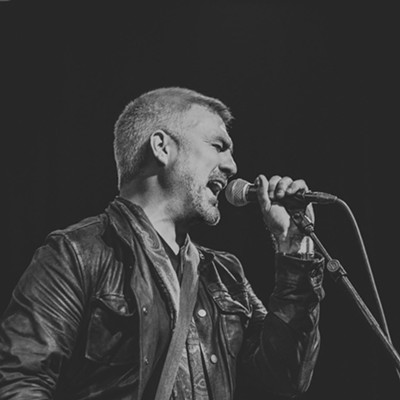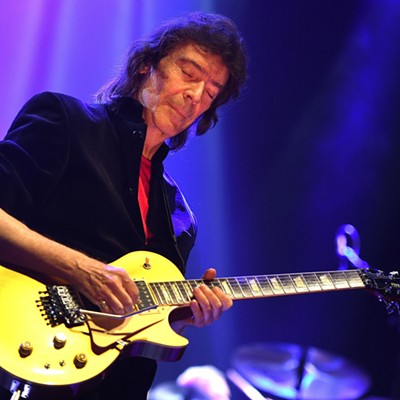It also pretty well sums up the approach of the 11-year-old, Oakland-based quartet Deerhoof, which will play Monday, Nov. 21, at Solar Culture Gallery.
Thing is, the four members of Deerhoof--who play disarming gems of songs built from zigzagging elements of pop, rock, folk and avant-garde music--wouldn't be caught dead creating, much less adhering to, anything so didactic as a manifesto.
"We don't think of ourselves as anything specific, as being part of any category or movement," says bassist Chris Cohen, speaking on his cell phone last week from a stop in Oklahoma City on the band's tour to promote its universally acclaimed new album, The Runners Four.
"Sometimes it might be a fun game, to imagine yourself as a certain type of musician while you're playing. You know, 'Right now, I'm like a mechanical marching band.' We don't think of our band as being part of any defined category."
Critics and listeners do enough of that, Cohen says.
"Not that I think they should. I mean, people do it so much, that the possibility of this or that description meaning anything just really goes away. It's impossible to believe in those categories anymore, just because we've been called so many different things. Categories generally don't do justice to artists in those kinds of situations."
He likens categories to periods in history.
"I love history, but it's impossible to capture a certain period in a phrase. If you're talking about a certain prehistoric age, for instance, there was so much going on simultaneously, and there were so many conflicting ideas about the world at any given time. In one part of the world, a brontosaurus might've been chewing on grass, and in another part of the world, a pterodactyl was attacking a giant snake. I kind of think of music in the same way."
A music scene or artistic movement is purely subjective, Cohen opines. "When people describe the Disco era, life to me at the time wasn't Studio 54; it was my mom buying me a candy bar, and she bought me this Beatles cassette. That's actually what I thought music was like in 1979. I thought it sounded like 1966."
Nevertheless, labels prevail. For instance, the interactive online encyclopedia Wikipedia.com defines Deerhoof as "an art-punk band from San Francisco that try to merge melody with noise," which, though grammatically clumsy, is reasonably accurate.
Even Cohen recognizes that commerce demands categorization.
"I mean, people have to arrange things in some fashion when you go to a record store, even if it's just alphabetical. Our CDs generally get filed in the rock sections, but I wouldn't care if they were under 'reggae' or 'hip-hop.'"
As marvelous and mysterious as Deerhoof's music is, let's face facts: You won't be hearing the band compared to, say, Burning Spear or Kanye West anytime soon.
Deerhoof was formed in 1994. According to legend, it was dadaistically named for a doggie chew toy, which probably was actually a cow's hoof. Drummer Greg Saunier remains the only founding member with the group. Satomi Matsuzaki--hitherto untrained in singing or playing an instrument--joined about a year later. She used to play bass, and now she mostly plays guitar.
Guitarist John Dieterich came aboard in 1999, and Cohen is the band's newest member, having joined in 2001. Since then, the band's membership has remained stable. The Runners Four is Deerhoof's seventh album, released jointly by the Washington-based independent labels Kill Rock Stars and 5 Rue Christine.
The band has attracted such high-profile supporters as Sonic Youth, cartoonist Matt Groening, Yeah Yeah Yeahs singer Karen O and members of the band Why? (which also recently played Tucson).
Deerhoof employs what is perhaps the most familiar configuration for a four-piece rock 'n' roll band--two guitars, bass and drums--but they use it to weave familiar elements of popular music into their jagged, almost-abstract compositions.
The Runners Four, a 20-song, double-length epic, has been described as containing some of the "hardest, rockier and more bottom-heavy songs the band seemingly ever recorded" by the San Francisco Bay Guardian, which ought to know, operating in the vicinity of Deerhoof's home base.
Flowing in and out of the CD's songs are brief references to 1970s art rock, faux-naïve composition, blues-based boogie, folky torch tunes and psychedelic music. The most easily identifiable element of Deerhoof's music is probably the singing of Matsuzaki, whose voice easily travels back and forth from little-girl yelps to fierce howls.
However, on The Runners Four, each of the band members sings, sometimes performing their own lyrics, sometimes those of their band mates. "On this record, everybody wrote lyrics, and everybody wrote music, and sometimes we play or sing the parts we wrote, and sometimes we don't," says Cohen.
"There aren't any delineated boundaries. Satomi sometimes plays drums, or John plays drums. There are no rules about what people's roles are. ... In terms of the songwriting, I would say more often than not, it doesn't come out of jamming, but actually, sometimes it does. We've tried every different, possible approach, and if we discover a new one, we'll try that."
Although loath to speak in specifics, Cohen says he and his cohorts in Deerhoof hope to elicit a response, any response, from their audiences.
"We're hoping for any effect at all, any effect just to be part of whatever might happen. This guy last night, we played in Lawrence, Kan., this really nice guy came to the show. He said, 'I listen to your music whenever I'm baking bread. It makes me really happy when I'm baking.' And he brought us a couple of loaves of bread."
Cohen is obviously pleased with that fan's response to Deerhoof's music, but he respects as valid any expression inspired by the band.
"If your music makes anybody happy or gives them any reaction, that's great. Sometimes people are even outraged. If someone reacts strongly to our music--you know: 'I don't like that!'--it's a great opportunity to ask themselves, 'Why don't I like that?'"







